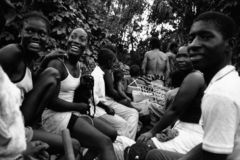
A happy return for some of the members of the displaced community of Cacarica. [Photo: Julien Menghini]
Article published in the special Newsletter '15 years of PBI', October 2009
Roberto Rodríguez, Beatriz García, Pedro Lázaro y Beatriz Muñoz, volunteers from Spain (1999-2006)
From Turbo, a village that receives thousands of displaced persons expelled from their lands by paramilitaries, the return is organised to the Cacarica, river basin, in the department of Chocó.
From first light, people were arriving in the port of Turbo with their sacks and personal possessions. There were the leaders, and those who were accompanying from the Inter-Church Justice and Peace Commission and PBI. During those early hours everything was hustle and bustle, movement, children, happiness, uncertainty. The chalupas (small canoes) were being loaded, the PBI launch was prepared. The brigadistas went back and forth bringing people from the shelters in the car. Others stayed at the port, walking up and down, observing, talking with the people from the Community for Self-determination, Life and Dignity (CAVIDA). There were a lot of people watching and there was a sense of unease.
The people got into the chalupas, start the motors, cry and sing «Hear me Chocó». Many people waved from the bank of the river. The return had begun. That is how we remember the different phases of the return to Cacarica. During the year 2000 there were three returns. As members of PBI we sometimes accompanied as far as the settlements and on other occasions we waved them off from the port. It was the year of reunions, returning to former lands, organisation, happiness, fear and solidarity. We were there, working together in order to make all this possible.
The shelters where we used to sleep, drink coffee, play with the children and listen to stories gradually became empty. The journeys along the river Atrato grew more frequent. The paramilitaries continued to kill In Turbo and in other communities accompanied by PBI. Feelings of all sorts intermingled with hard work. The PBI volunteers were a small part of this visible story of solidarity that brought together the conditions for the return to Cacarica.
Nueva Vida is one of the places of return in Cacarica and has been organised into a humanitarian zone as a measure of self-protection. The women here organised the community soup kitchen and the reception area, a place to meet over a dish of rice. We all slept in the school and the chapel. The PBI volunteers became very efficient at putting up mosquito nets, living with mosquitos, and rising early to fish. We witnessed the building of the first houses, football tournaments, long meetings until nightfall, and the conversations with the accompaniers from Justice and Peace. We lived through times of great ambivalence, the «normality» of every day life, bathing in the river with the news of massacres in other communities and the accusations and threats against CAVIDA.
That was the year 2000, and the people continued to return «in the midst of the war», as they always used to say. They would qualify this by calling for state responsibility, international accompaniment and expressing their desire to «live and work in peace as dignified communities that can restore their rights and perhaps see justice one day»1 . And PBI was there.
1 «Return to Cacarica», El País newspaper (Spain), 16 March 2000
--
Around 200 displaced persons crossed the mountains of Darién and took refuge in Panama. From there they were repatriated to a place on the Pacific coast called Cupica, which was far from their lands and families. In 2000 they left this village in order to be reunited in Turbo with their families and to return together to Cacarica:
The preparations continued, the sacks piled up besides the houses, the children ran around, there were happy faces and worried faces. People said goodbye to the friendships of those three long years. They gave personal belongings to their neighbours and agreed who would keep the wood and the houses. The light aircraft began to arrive. Pregnant women and babies got on first, followed by the elderly and families. Laughter, hugs and enthusiasm. The light aircraft took off with people, hunting dogs and the few belongings. Finally those providing accompaniment got into the last light aircraft with some mementos, all our dreams and a knot in our stomachs because of what we were experiencing. Ten days later we returned to the house of the PBI team. They were waiting for us with dinner and a few beers and we talked and talked about everything that had happened. We went to sleep with images in our and emotions in our heads. Many months of work, happiness and sadness had taken on meaning and value.
